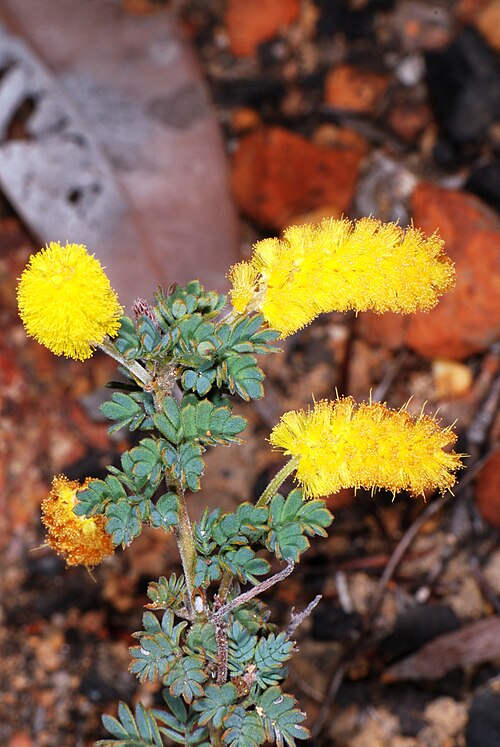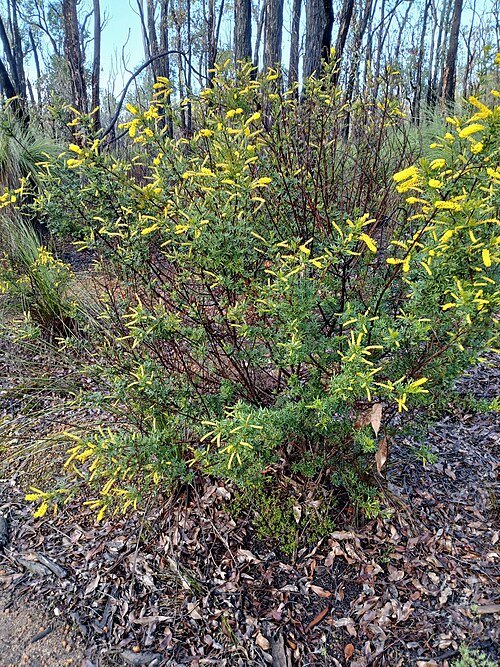Drummond’s Wattle: A Golden Gem from Down Under
If you’re dreaming of adding a splash of sunshine to your garden, let me introduce you to Drummond’s wattle (Acacia drummondii). This delightful Australian native might just be the golden ticket your landscape has been waiting for – literally! With its cheerful yellow blooms and easy-going nature, this charming shrub has won hearts far beyond its native Western Australia.
What Makes Drummond’s Wattle Special?
Picture this: a medium-sized shrub bursting with bright yellow, fluffy flower heads that look like tiny golden pom-poms dancing in the breeze. That’s Drummond’s wattle in all its glory! The flowers aren’t just pretty – they’re deliciously fragrant and appear when you need them most, brightening up the winter and spring months when many other plants are taking a snooze.
The foliage is equally attractive, featuring fine, feathery leaves (technically called phyllodes) that create a soft, airy texture. This gives the plant an almost ethereal quality that works beautifully as a backdrop for other garden stars or as a stunning specimen on its own.
Where Does It Come From?
Drummond’s wattle hails from the sun-soaked landscapes of Western Australia, particularly around the Perth region and the state’s southwest corner. This Mediterranean-climate native has adapted to thrive in areas with wet winters and dry summers – a pretty neat survival strategy!
Why Consider Drummond’s Wattle for Your Garden?
Here’s where things get exciting for gardeners:
- Drought tolerance: Once established, this tough cookie can handle dry spells like a champ
- Pollinator magnet: Bees and butterflies absolutely adore those nectar-rich flowers
- Year-round interest: Attractive foliage keeps things interesting even when not in bloom
- Fast growth: You won’t be waiting decades to enjoy its beauty
- Versatile sizing: Perfect for medium-sized gardens without overwhelming smaller spaces
Perfect Garden Companions
Drummond’s wattle shines brightest in Mediterranean-style gardens, water-wise landscapes, and coastal settings. It’s fantastic for creating natural screens, adding structure to mixed plantings, or serving as a stunning focal point. The key is pairing it with plants that share its love of well-draining soil and sunshine.
Growing Drummond’s Wattle Successfully
Ready to give this golden beauty a home? Here’s your roadmap to success:
Climate considerations: This plant thrives in USDA zones 9-11, where frost is rare to nonexistent. If you live in colder areas, you might need to admire it in pictures or consider growing it in a large container that can be protected in winter.
Soil requirements: The magic word here is drainage. Drummond’s wattle absolutely must have well-draining soil. Clay soils that hold water will send this plant to an early grave. If your soil is heavy, consider raised beds or adding plenty of coarse sand and organic matter.
Sun and water needs: Full sun to partial shade works best, though it’ll bloom more prolifically in full sun. Water regularly during the first year while roots establish, then scale back to occasional deep watering during prolonged dry spells.
Planting and Care Tips
- Planting time: Fall or early spring gives the best start
- Spacing: Allow 6-8 feet between plants for good air circulation
- Fertilizing: Less is more! Over-fertilization can reduce flowering
- Pruning: Light pruning after flowering helps maintain shape and encourages bushy growth
- Mulching: A light layer of coarse mulch helps retain moisture and suppress weeds
A Word About Native Alternatives
While Drummond’s wattle is absolutely lovely, remember that native plants always get first dibs on supporting local wildlife. If you’re not in Western Australia, consider exploring native wattles or other flowering shrubs from your region first. Your local pollinators and birds will thank you for choosing plants they’ve evolved alongside!
The Bottom Line
Drummond’s wattle offers gardeners a winning combination of beauty, toughness, and wildlife value. Its golden blooms and graceful form can transform any Mediterranean-climate garden into a year-round showstopper. Just remember to give it the well-draining soil it craves, and this Australian charmer will reward you with years of sunny disposition – even on the cloudiest days!






